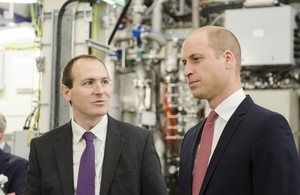Duke of Cambridge unveils the UK's new fusion project at Culham
The Duke was at Culham to mark the end of construction of the UK’s new fusion experiment, MAST Upgrade.

del
The Duke of Cambridge visited one of the hottest places in the Solar System today when he joined the UK Atomic Energy Authority (UKAEA) at Culham Science Centre near Oxford to see a potentially world-changing energy project.
During Green GB Week, it was a particularly fitting time to view research into fusion energy – the power source of the Sun – and how it could be commercialised to provide huge amounts of low-carbon electricity.
The Duke heard about the five-year project to build a machine capable of creating artificial stars and stood yards away from the MAST Upgrade chamber where, in a few months’ time, temperatures of 50 million degrees C will be created – over three times hotter than the Sun. He then ran a test of a ‘plasma’ – the hot gas that will form inside MAST Upgrade when it operates.
The UK Atomic Energy Authority runs the UK’s national fusion research lab at Culham, and its £50 million MAST Upgrade device will put Britain at the forefront of international research when it starts up in 2019. MAST Upgrade will explore whether smaller reactors – the so-called ‘spherical tokamak’ design – could make future fusion power cheaper. It will also trial a novel way to exhaust heat from the large fusion reactors that are expected to be on the grid by the middle of the century.
UKAEA’s CEO Professor Ian Chapman said:
It was a privilege to welcome The Duke of Cambridge to Culham as we prepare to start a major new fusion experiment.
The report from the Intergovernmental Panel on Climate Change last week reminded us how badly the world needs cleaner energy. We think fusion has a big role to play. The fuels are abundant around the globe, it doesn’t release greenhouse gases and it doesn’t produce long-lived radioactive waste like the nuclear fission power we have today. Building a star on Earth is very difficult – but the research is fascinating and knowing that we could change the world is a big motivation.
……….. Ends
For more information contact Nick Holloway, UKAEA Media Manager: nick.holloway@ukaea.uk / 01235 466232
Notes to Editors
UK Atomic Energy Authority
The UK Atomic Energy Authority (UKAEA) carries out fusion energy research on behalf of the Government at Culham Science Centre near Abingdon. It is also developing Culham as a location of hi-tech research and business, with around 40 tenant companies now on site. UKAEA’s fusion lab Culham Centre for Fusion Energy oversees Britain’s fusion programme, headed by the MAST Upgrade (Mega Amp Spherical Tokamak) experiment. It also hosts the world’s largest fusion research facility, JET (Joint European Torus), which it operates for European scientists under a contract with the European Commission. More information
Fusion energy research
Fusion research aims to copy the process which powers the Sun for a new large-scale source of clean energy here on Earth. When light atomic nuclei fuse together to form heavier ones, a large amount of energy is released. To do this, fuel is heated to extreme temperatures, hotter than the centre of the Sun, forming a plasma in which fusion reactions take place. A commercial power station will use the energy produced by fusion reactions to generate electricity.
Fusion has huge potential as a long-term energy source that is environmentally responsible (with no carbon emissions) and inherently safe, with abundant and widespread fuel resources (the raw materials are found in seawater and the Earth’s crust). Researchers at Culham are developing a type of fusion reactor known as a ‘tokamak’ – a magnetic chamber in which plasma is heated and controlled. The research is focused on preparing for the international tokamak experiment ITER, now being built in southern France. ITER – due to start up in 2025 – is designed to show that fusion can work on the scale of a powerplant, and if successful should lead to electricity from fusion being on the grid by 2050.
Fusion research at Culham is funded by the Engineering and Physical Sciences Research Council and by the European Union under the EURATOM treaty.
MAST Upgrade
MAST Upgrade is a £50 million fusion experiment launching at Culham in 2019. It will explore technology for the first fusion power stations and take on one of the biggest challenges in fusion research: ‘plasma exhaust’, or how to exhaust excess heat from fusion reactors. This is a challenge that must be solved if fusion reactors are to be commercially viable. MAST Upgrade is the first experiment to trial an innovative exhaust system called the Super-X Divertor.
MAST Upgrade will also develop a promising design for smaller, cheaper fusion reactors – the spherical tokamak. MAST Upgrade is mainly funded by the UK Government (Department of Business, Energy & Industrial Strategy) with additional contributions from EUROfusion, and from collaborators at UK universities and from the United States.
Green GB Week
Green GB Week is a week of activities between 15-19 October, bringing together businesses, groups and communities to promote the opportunities of clean growth and to highlight actions for tackling climate change. More information
Updates to this page
-
Change from nuclear fusion to fusion energy wording
-
First published.